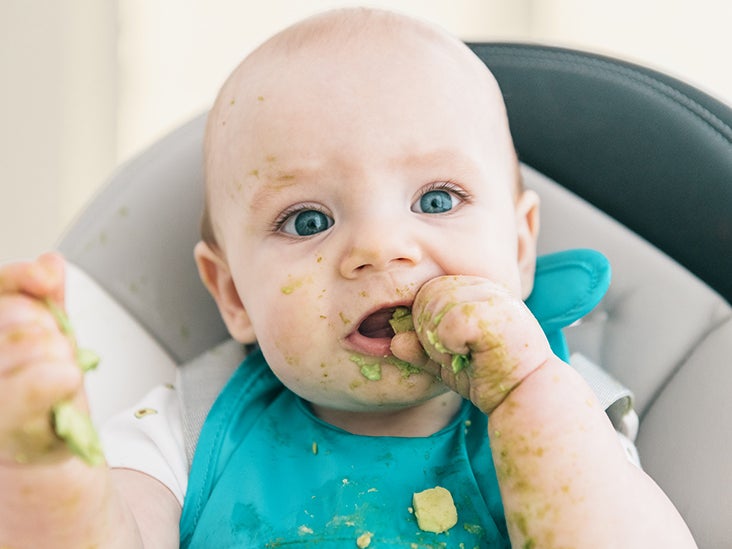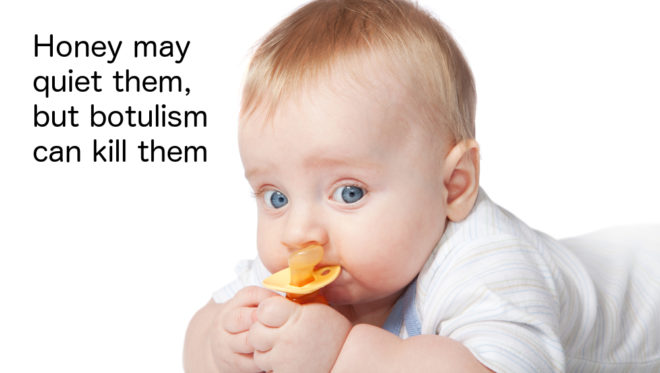botulism poisoning in babies
It prevents the release of the neurotransmitter acetylcholine from axon endings at the neuromuscular junction thus causing flaccid paralysis. It develops when C botulinum spores are eaten by a baby and the bacteria grow in his intestines making toxins within the gut.

What Parents Need To Know About Botulism
Contact your doctor immediately if your baby shows signs of any of the following symptoms of infant botulism.

. In adults and older children botulism causes weakness in the muscles around the eyes mouth and throat. However as botulism develops parents and caregivers may notice additional signs that include. Infant botulism is a potentially life-threatening disease caused by a bacterium called Clostridium botulinum.
Botulism can result from eating food that has been contaminated with the toxin foodborne botulism or ingesting food dust or soil that contains the bacteria that produce the toxin intestinal botulism or contaminating a wound with the bacteria wound botulism. Causes Clostridium botulinum is a spore-forming organism that is common in nature. Infant botulism usually affects babies between 3 weeks and 6 months old but all babies are at risk until their first birthday.
Lets take a look at each in more detail. Ad Learn what causes botulism including its symptoms and how its treated. The toxin causes the disease botulismThe toxin is also used commercially.
It grows inside a babys gastrointestinal tract. As the toxin is absorbed it irreversibly binds to acetylcholine receptors on motor nerve terminals at neuromuscular junctions. Food and Drug Administration for the treatment of infant botulism types A and B.
The condition can occur in. Botulism also can weaken the muscles involved in breathing which can lead to difficulty breathing and even death. Trouble feeding weakened muscle tone difficulty breathing lack of facial expressions decrease in movement trouble swallowing excessive.
The enteric toxin causes intestinal immobility and progressive descending paralysis due to the effect on acetylcholine release at the neuromuscular junction and other cholinergic nerve terminals particularly in the gut. Typical symptoms of infant botulism include constipation lethargy weakness difficulty feeding and an altered cry often progressing to a complete descending flaccid paralysis. This weakness may spread to the neck arms torso and legs.
The spores germinate into bacteria that colonize the bowel and synthesize toxin. Botulinum toxin causes weakness and loss of muscle tone because it blocks the nerve endings ability to signal the linked. Infant botulism is a rare but serious gastrointestinal condition caused by exposure to Clostridium botulinum C.
Botulinum toxin BoNT often shortened to Botox is a neurotoxic protein produced by the bacterium Clostridium botulinum and related species. They may be present in soil or dust and then become airborne where they are breathed in and swallowed by the child. Infant botulism most commonly affects babies 3 weeks to 6 months old but babies are at risk until they are 1 year old.
Our patient is the twelfth confirmed case with eleven cases reported up until June 2011. An infant can acquire botulism by ingesting Clostridium botulinum spores which are found in soil or honey products. Propagation of this toxin under different circumstances can lead to food-borne wound or infant botulism.
Botulism is a broad term encompassing 3 clinical entities caused by botulinum toxin. Botulism is a rare but serious illness caused by a toxin that attacks the bodys nerves. The source of the spores is usually unclear.
Is constipated has weak muscles is too weak to cry or suck as usual has a wobbly head because the neck is weak lacks facial expression has weak arms and legs has trouble breathing is not. The product is a solvent-detergent-treated sterile lyophilized powder of immunoglobulin G IgG stabilized with 5. The most dangerous effect is paralysis of the diaphragm which means the infants cannot breathe on their own without a respirator until the disease is cured.
Botulinum causes botulism which is especially dangerous for babies less than 1 year of age. Causes of Infant Botulism Babies can get. Intestinal botulism affecting children under 12 months of age is known as infant botulism.
Campylobacter is the most frequent bacterial cause of food poisoning. Infant botulism is the infectious intestinal form of botulism which results when swallowed spores of a particular bacterium Clostridium botulinum colonize the babys large intestine and produce botulinum toxin in it. Symptoms of botulism usually start with weakness of the muscles that control the eyes face mouth and throat.
Infant botulism occurs mostly in babies younger than 6 months. Botulism is a rare but dangerous type of poisoning that affects the nervous system. These spores release a toxin that can poison infants.
Infantile botulism is rare in UK. For this reason most pediatricians recommend that parents and care-givers avoid giving honey and processed foods containing honey to children until they are 1 year old. Symptoms usually appear around 12 to 36 hours after being exposed to the toxin.
Campylobacter is usually transmitted through raw or undercooked poultry or unpasteurized milk. 9 rows An infant can acquire botulism by ingesting Clostridium botulinum spores which are found in soil. Although constipation is usually the first symptom of infant botulism it is commonly overlooked.
Honey can contain botulism spores. Bacteria from the spores can grow and multiply in a babys intestines producing a dangerous toxin. Infant botulism is a rare condition caused by intestinal colonization with Clostridium botulinum.
BabyBIG Botulism Immune Globulin Intravenous Human BIG-IV is an orphan drug that consists of human-derived anti-botulism toxin antibodies that is approved by the US. 4 5 Infantile botulism tends to affect babies between the ages of 2 and 6 months but has been reported in infants as young as 54 h and as late as 1 year. Infant botulism when a baby swallows a resistant form of the bacteria called a spore in contaminated soil or food such as honey these spores are harmless to older children and adults because the body develops defences against them from about the age of 1 All these types of botulism are very rare in the UK but occasional cases do occur.
The spores may be found in soil and certain foods such as honey and some corn syrups.

Remedies For A Crying Baby Baby Crying Baby Bringing Up Bebe

Infant Botulism The Day I Learned To Trust My Mom Gut Wral Com

11 Foods For Baby Led Weaning And What Foods To Avoid

Botulism A Danger To Babies Health Life Magazine

Why Can T Babies Age 0 12 Months Eat Raw Honey The West Indian Honey Company

What Is Infant Botulism How Is It Treated Causes Symptoms Prevention Of Infant Botulism

Infant Botulism What You Need To Know By Barb Ingham Extension Winnebago County

Why You Should Not Give Honey To Babies Ary News

Baby Teeth Frequently Asked Questions Parents

Pdf Infant Botulism First Two Confirmed Cases In Slovenia And Literature Review Semantic Scholar

Babies Honey And Botulism Microbiology

Infant Botulism The Day I Learned To Trust My Mom Gut Wral Com

Colorado Parents Warn Others About Infant Botulism Youtube

Infant Botulism The Day I Learned To Trust My Mom Gut Wral Com

Can Babies Learn To Love Vegetables Baby Learning Baby Food Recipes Dark Green Vegetables

Botulism In Babies Baby Dies After Family Feeds Him Honey

Infantile Botulism Clinical Manifestations Treatment And The Role Of The Nurse Practitioner The Journal For Nurse Practitioners

Why Babies Can T Have Honey Honey And Infant Botulism

Can An Infant Eat Honey Nut Cheerios Livestrong Com Baby Eating Toddler Finger Foods Toddler Meals